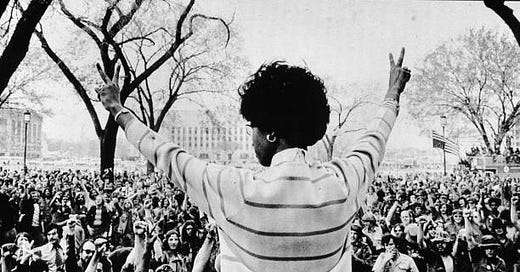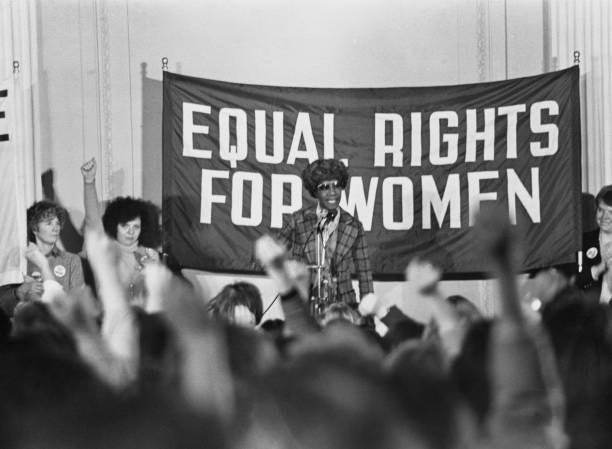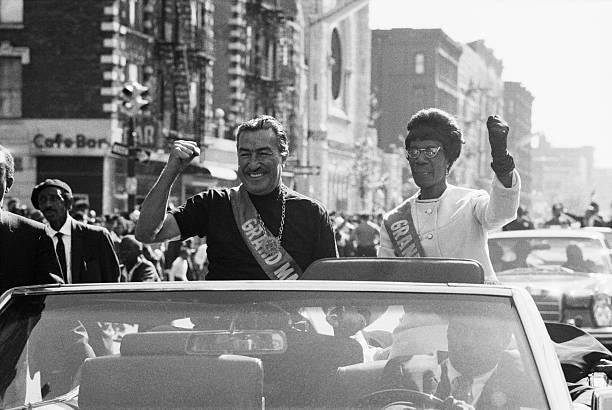US congresswoman Shirley Chisholm gives the peace sign to a crowd of protestors as she speaks to veterans on the Washington Mall, Washington, DC, April 1971
Born 99 years ago today, Shirley Anita Chisholm knew she wasn’t going to win when she ran for president 48 years later in 1972. America wasn’t ready for her. But she was going to get it ready! This fiery former teacher wanted to redefine the realm of the possible in American politics and to give a voice to those who were traditionally marginalized in the political process.
In July 1972, the Democratic National Convention in Miami was charged with tension. This event, following closely on the heels of the Watergate break-in at the Democratic headquarters, was crucial in determining who would challenge President Richard Nixon in the upcoming election. Amidst this pivotal moment, Shirley Chisholm made history as the first Black woman to contend for the Democratic presidential nomination.
Shirley Chisholm was no stranger to breaking barriers. As the first Black woman to serve in the U.S. Congress, representing a New York district since 1968, she continued her trailblazing path by announcing her presidential candidacy in January 1972.
She was the first Black American to seek a major party’s presidential nomination; the first woman to do so was Margaret Chase Smith in 1964 for the Republicans. Chisholm's campaign, under the banner “Unbought and Unbossed,” faced skepticism from the outset, particularly from white male journalists and politicians.
Norman Mailer, writing in the Wall Street Journal, dismissed her campaign as unrealistic. While Chisholm garnered strong support from Black women, she found it challenging to attract the backing of Black men and white women, many of whom preferred Senator George McGovern, believing him to have a better chance against Nixon.
Understanding the odds against her, Chisholm wanted to influence the convention’s outcome by forming a coalition. Her strategy was to leverage her delegates to advocate for the rights of women, Black and Indigenous people.
One of Chisholm’s most notable opponents was George Wallace, the former segregationist governor of Alabama. Their competing in the same primary was remarkable given their vastly different stances. Chisholm’s campaign implicitly opposed what Wallace represented. Interestingly, Wallace had a peculiar fondness for Chisholm, once suggesting that his supporters vote for her if not for him, a statement that inadvertently harmed Chisholm’s campaign in Florida.
Image: Shirley Chisholm (1924–2005), Member of the US House of Representatives from New York's 12th district, cheered by the crowd as she gives a speech at the Women's Rights Day, US, 4th April 1981.
Wallace’s campaign ended abruptly after an assassination attempt in May, which deeply affected Chisholm. Despite their political differences, she visited him in the hospital, a decision that dismayed many of her supporters.
At the convention, Chisholm secured 152 delegates, surpassing notable figures like Senators Hubert Humphrey and Edward Muskie but still trailing behind McGovern, Henry Jackson, and Wallace. McGovern’s overwhelming lead made negotiations with Chisholm’s delegates unnecessary.
Despite not being able to leverage her delegate count, Chisholm's campaign was significant in challenging the notion that only white men were suitable presidential candidates. She faced severe racism and sexism, evidenced by the defacement of her campaign materials and derogatory comments. Nevertheless, her candidacy paved the way for future Black and female presidential candidates.
Chisholm was well aware of the systemic barriers and societal prejudices and knew that her chances of winning were slim. Yet, her campaign was not about securing the presidency; it was about initiating a dialogue, breaking barriers, and laying a foundation for future generations. By entering the race, Chisholm sought to demonstrate that a black woman could aspire to the highest political office in the nation. She confronted head-on the double bind of racism and sexism, showing remarkable courage and resilience.
Image: New York: Harlem Congressman Adam Clayton Powell Jr and Congresswoman Shirley Chisolm of Brooklyn give the clenched fist Black Power salute during a parade in Harlem Sept. 21, 1969. It was the first Afro-American parade in a city known for ethnic demonstrations
Shirley Chisholm wanted to demonstrate the possibility of her candidacy. Chisholm passed away in 2005, before witnessing Barack Obama and Hillary Clinton achieve significant milestones in American politics. Curwood believes Chisholm would have been amazed at the progression, yet possibly surprised at the time it took to reach these milestones.
Resources
https://history.house.gov/Blog/2020/September/9-14-Chisholm-1972/
https://history.house.gov/People/Detail/10918
https://womenshistory.si.edu/spotlight/shirley-chisholm
https://nmaahc.si.edu/shirley-chisholm-president
https://www.biography.com/political-figures/shirley-chisholm
https://www.history.com/news/shirley-chisholm-presidential-campaign-george-wallace
https://www.archives.gov/research/african-americans/individuals/shirley-chisholm
https://avoice.cbcfinc.org/exhibits/women-of-the-cbc/shirley-a-chisholm-biography/
15/
Books
Chisholm, Shirley. The Good Fight. New York: Harper & Row, 1973.
Chisholm, Shirley. Unbought and Unbossed. Boston: Houghton Mifflin, 1970.
Curwood, Anastasia C. Shirley Chisholm: Champion of Black Feminist Power Politics. chapel Hill, NC: University of North Carolina Press, 2022.
Falk, Erika A. "Women, Press, and the Presidency." Ph.D., diss., University of Pennsylvania, 2001.
16/
Haskins, James. Fighting Shirley Chisholm. Los Angeles: Dutton Books, 1975.
Hicks, Nancy. The Honorable Shirley Chisholm: Congresswoman From Brooklyn. New York: Lion Books, 1971.
Scheader, Catherine. Shirley Chisholm: Teacher and Congresswoman. Berkeley Heights, N.J.: Enslow Publishers, Inc., 1990.







Not to mention she was very, very fashionable! Love this, thank you so very kindly!
I learned a lot from your post. Thank you!!